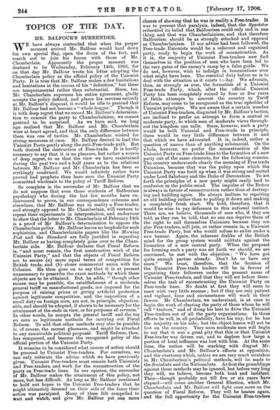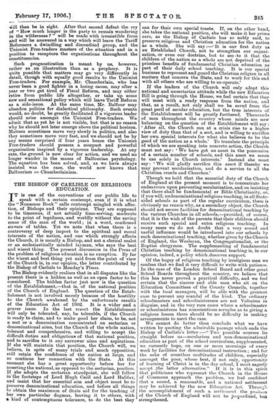TOPICS OF THE DAY.
MR. BALFOUR'S SURRENDER.
WE have always contended that when the proper moment arrived Mr. Balfour would haul down his own special flag, open the doors of the fort, and march out to join his forces with those of Mr. Chamberlain. Apparently the proper moment was destined to be Wednesday, February 14th, 1906, for on that day Mr. Balfour wrote his letter adopting the Chamberlain policy as the official policy of the Unionist Party. It is true that Mr. Balfour makes a few limitations and hesitations in the course of his "definition," but these are temperamental rather than substantial. Since, too, Mr. Chamberlain expresses his entire agreement, gladly accepts the policy defined, and places his services entirely at Mr. Balfour's disposal, it would be idle to pretend that Mr. Balfour had not become a" whole-hogger.' Though it is with deep regret that we record Mr. Balfour's determina- tion to commit the party to Chamberlainism, we cannot p,retend to be surprised. As we have said, we long ago realised that Mr. Balfour and Mr. Chamberlain were at heart agreed, and that the only difference between there was one of tactics. Mr. Chamberlam wished for strong measures at once. Mr. Balfour desired to lead the Unionist Party gently along the anti-Free-trade path. But both desired the destruction of Free-trade. It is hardly necessary to say that it is no pleasure, but rather a source of deep regret, to us that the view we have maintained during the past two and a half years as to the relations between Mr. Balfour and Mr. Chamberlain has been eo strikingly confirmed. We would infinitely rather have proved bad prophets than have seen the Unionist Party committed wholesale to the policy of Tariff Reform.
So complete is the surrender of Mr. Balfour that we do not suppose that even those students of Balfourian psychology who during the last few months have en- deavoured to prove, in our correspondence columns and elsewhere, that Mr. Balfour was in reality a Free-trader, and strongly opposed to Mr. Chamberlain, will venture to repeat their experiments in interpretation, and endeavour to show that the letter to Mr. Chamberlain of February 14th is a proof of Mr Balfour's determination to oppose the Chamberlain policy. Mr. Balfour leaves no loophole for such sophistries, and Chamberlainite papers like the Morning Post and the Standard are fully justified in regarding Mr. Balfour as having completely gone over to the Cham- berlain side. Mr. Balfour declares that Fiscal Reform is, "and must remain, the first constructive work of the Unionist Party," and that the objects of Fiscal Reform are to secure (a) more equal terms of competition for British trade, and (b)- closer commercial union with the Colonies. He then goes on to say that it is at present unnecessary to prescribe the exact methods by which those objects are to be obtained. But, he adds, " though other means may be possible, the establishment of a moderate general tariff on manufactured goods, not imposed for the purpose of raising prices or giving artificial protection against legitimate competition, and the imposition of a small duty on foreign corn, are not, in principle, objection- able, and should be adopted, if shown to be necessary for the attainment of the ends in view, or for purposes of revenue." In other words, he accepts the general tariff and the tax on corn as legitimate methods for carrying out Fiscal Reform. To add that other methods may also be possible is, of course, the merest pleonasm, and might be attached to any conceivable political proposal. Tariff Reform, then, has conquered, and become the recognised policy of the official portion of the Unionist Party.
It remains to be considered what course of action should be pursued by Unionist Free-traders. For ourselves, we can only reiterate the advice which we have previously given. Unionist Free-traders must remain both Unionists and Free-traders, and work for the reconstruction of the party on Free-trade lines. In our opinion, the surrender of Mr. Balfour makes the attainment of this policy, not more, but less difficult. As long as Mr. Balfour continued to hold out hopes to the Unionist Free-traders that he might ultimately descend on their side of the fence their action was paralysed. Many of them felt compelled to wait and watch, and give Mr. Balfour yet one more chance of showing that he was in reality a Free-trader. It was to prevent that paralysis, indeed, that .the Spectator reiterated its belief that Balfourism could only end. in one thing, and that was Chamberlainism, and that therefore Balfourism should be as strongly attacked and opposed as Chamberlainism. If our advice bad been followed, the Free-trade Unionists would be a coherent and organised party, ready to begin the work of reconstruction. As it is, the majority of Unionist Free-traders now fipa themselves in the position of men who have been led to the very gates of the enemy's camp by a false guide. We do not, however, wish to indulge in lamentations over what might have been. The essential duty before us is to deal with the situation as it exists to-day. We advocate, then, as strongly as ever, the formation of a -Unionist. ' Free-trade Party, which, after the official Unionist Party has been completely ruined by four or five years of futile attempts to convert the country to Tariff Reform, may come to be recognised as the true upholder of Unionist principles. We are aware that a certain number of Unionist Free-traders, disgusted by Mr. Balfour's tactici, are inclined to prefer an attempt to form a central Or moderate party, to which men of moderate views through- out the kingdom can rally. Since, however, such a party would be both Unionist and Free-trade in principle, there would be very little difference between it and that which we have advocated. It is, indeed, rather a question of names than of anything substantial. On the whole, however, we prefer the reconstruction of the Unionist Party on Free-trade lines to the formation of a new party °tit of the same elements, for the following reasons. The Country understands clearly the meaning of Free-trado Unionism, because that was the .poliqy. Upon which the Unionist Party was built up when it was strong and united under Lord Salisbury and the Duke of Devonshire. To set forth the principles of a new party might easily lead to confusion in the public mind. The impulse of the Briton is always in favour of reconstruction rather than of destroy- ing and building again. He always inclines to repairing an old building rather than to pulling it down arid. making a completely fresh start. We hold, therefore, that it would be wise to pay deference to this national instinct. There are, we believe, thousands of men who, if they are told, as they can be told, that no one can deprive them of the right to call themselves Unionists because they are also Free-traders, will join, or rather remain in, a Unionist Free-trade Party, but who would refuse to enlist under a new banner. Again, the inherent dislike of the British mind for the group system would militate against the formation of a new central party. When the proposal for forming such a party was set forth we should, we are convinced, be met with the objection : "We have got quite enough parties already. Don't let us have any more." We trust, therefore, that the decision of the Unionist Free-trade leaders will be in favour of organising their followers under the present name of Unionist Free-traders, and that they will set before them- selves the task of reconstructing the Unionist Party on Free-trade lines. No doubt at first they will seem to meet with very little success ; but if they are only patient and vigilant, time and. circumstance will work in their favour. Mr Chamberlain, we understand, is at once to begin the work of clearing the party of those whom he will call "traitors," and of doing his best to drive the Unionist Free-traders out of all the party organisations. In these efforts he will, in all probability, have his way, for he has the majority on his side; but the object-lesson will not be lost on the country. Very soon moderate men will begin to say that it was a great pity that this or that Unionist Free-trader was driven out, and to deplore hoW large a portion of local influence was lost with him. At the mine time, the nation will be marking with disgust Mr. Chamberlain's and Mr. Balfour's efforts at opposition, and the overtures which, unless we are very much mistaken in Mr. Chamberlain's political methods, will be made to the Socialists and the Nationalists. At first the grumblings against these methods may be ignored, but "before very long they will, we believe, become both loud and Insistent. Then—though probably not till five or six years have elapsed—will come another General Election, which Mr. Chamberlain' and Mr. Balfour will fight once more on the question ' of Fiscal Reform. They will be beaten again, and the full opportunity for the Unionist Free-traders N-611 then be in sight. After that second defeat the cry of "How much longer is the party to remain wandering in. the wilderness ? " will be made with irresistible force aid will be answered in a way which will leave the Tariff Reformers a dwindling and discredited group, and the Unionist Free-traders masters of the situation and in a position to recapture the organisations throughout the constituencies.
Such prognostication is meant by us, however, rather as an illustration than as a prophecy. It is quite possible that matters may go very differently in detail, though with equally good results to the Unionist Free-traders. For example, Mr. Chamberlain, who has never been a good fighter in a losing cause, may after a year or two get tired of Fiscal Reform, and may either retire from public life altogether, or take up some new and sensational policy which will leave Tariff Reform as a side-issue At the same time, Mr. Balfour may abandon politics for dialectical philosophy. Such events would, no doubt, be greatly facilitated if a vigorous leader should arise amongst the Unionist Free-traders. We admit that as yet he is not visible, but that is no reason why he should not later emerge above the political horizon. Matters sometimes move very slowly in politics, and also they sometimes move very fast, and we should not be by any means surprised if four years hence the Unionist Free-traders should possess a compact and powerful organisation inspired by a vigorous leadership. At any rate, the ground is now clear for action, and we need no longer wander in the mazes of Balfourian psychology. The equation has been solved, and, as we have always insisted was the case, the world now knows that Balfourisra = Chamberlainism.











































 Previous page
Previous page